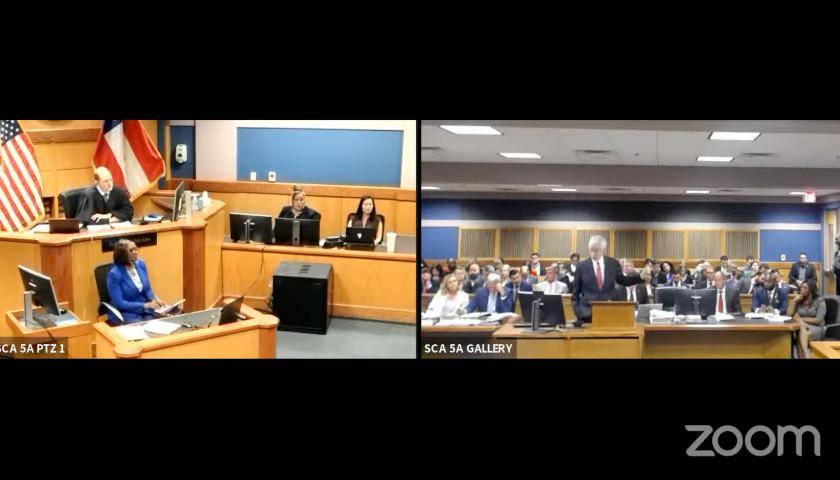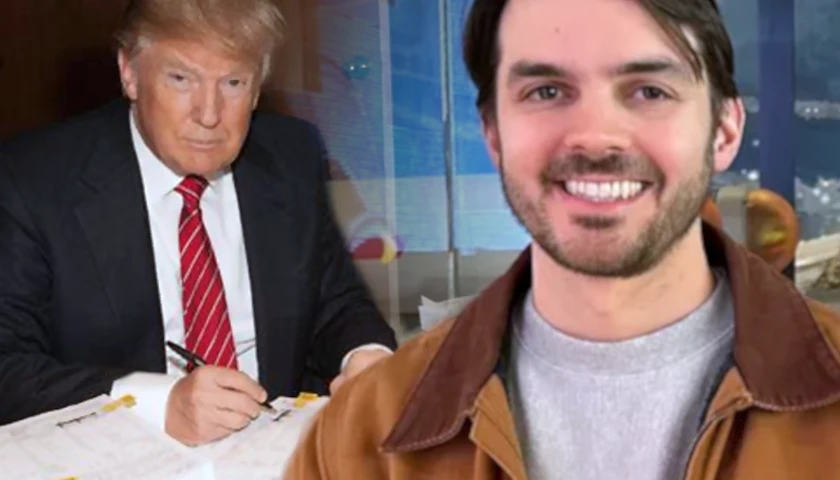Fulton County Superior Court Judge Scott McAfee heard arguments last week from defense attorneys about why Fulton County District Attorney Fani Willis should be disqualified from her RICO case against former President Donald Trump and his associates.
Willis had an affair with Nathan Wade, the prosecutor she appointed to lead the case. This caused attorneys, including Harry MacDougald, who represents Jeffrey Clark, to list six conflicts of interest she faces in a presentation to the court.
Clark was indicted for drafting a memo to Georgia officials that was never sent in his capacity as a DOJ official. The memo laid out their legal options to deal with the illegal activity in the 2020 election.
MacDougald said even under the toughest standard to meet, actual conflict, Willis should be disqualified, which is what his six criteria focused on. He cited Rule 1.7 of the Rules of Professional Conduct (attorneys’ ethics rules are mostly the same in each state, adopted from the American Bar Association’s model rules), which covers conflicts of interest. It states that lawyers must withdraw from the case or be disqualified when they have a conflict of interest. Additionally, he said it is embedded in the prosecutors’ oath to act impartially.
MacDougald explained that the test for removing a lawyer from a case is whether “the conflict of interest impairs the lawyer’s independent professional judgment.” It does not need to be a financial conflict, but could be “any conflict that impairs your independent professional judgment,” such as a “personal interest,” he said, citing case law.
“The root of all of the problems that we see in this court right now is a conflict of interest, arising from individual personal interests in perpetuating and concealing their relationship,” he said. “That’s the original sin, from which all of the other problems flow.”
MacDougald added that “six conflicts of interest in this case, any one of which warrants disqualification, but collectively practically compelling.”
The first conflict of interest was financial, he said. The limiting principle was “whatever affects the independent professional judgment of the lawyer.” While much of the financial conflict of interest was already brought out, he added that the two contracts with Wade were “executed after they acknowledged the relationship began.”
MacDougald said the second conflict of interest was Willis’s “personal ambition” versus her “political ambition,” which dovetailed with the third conflict of interest, a “complementary pattern of deceit and concealment of the relationship and money.” He cited Fulton County Superior Court Judge Robert McBurney chastising Willis for hosting a fundraiser for a Democratic candidate running against one of the investigation’s potential targets.
MacDougald pointed out how a flattering book about Willis and her RICO prosecution was recently published, based on Willis’ “exclusive access to thousands of secret documents, emails, text messages, and audio recordings.”
Yet the defense cannot get access to those materials, MacDougald said. “The court has twice denied defense motions to unseal special purpose grand jury materials. She helped herself to get the glory of this book.”
He said Willis violated three obligations in the county code.
The lawyer said that “she has to go to the planning commission to get approval to pay him like she did.” MacDougald continued that Willis “cannot accept gifts from a prohibited source.” He added that Willis “has to disclose the gifts that she received. There’s no boyfriend exception.”
MacDougald went on, “Her disclosure forms from 2022 are false,” because she was “keeping the gravy train rolling for as long as possible. … That’s a conflict of interest between her duties as a prosecutor and her personal interests with the relationship.”
As for Wade, MacDougald said his role was similar to that in divorce cases, where a husband hides how much money he’s making from his wife, hides the other woman, and hides what he’s spending on the other woman. “He got on the stand, and he lied.”
MacDougald observed that “lawyers for the district attorney did nothing to correct the perjured testimony. That warrants disqualification of every one of them.”
“The reason they lied and covered it up was to avoid the trouble they’re in right now,” he said. “That served their personal interests to the detriment of their public duties as prosecutors.”
MacDougald said the fourth conflict of interest was Willis’s speech at Atlanta’s oldest black church.
“She did it to deflect attention from her own misconduct,” he explained. “She violated her ethical duties as a prosecutor to serve the personal interests of her boyfriend.”
The fifth conflict of interest was the Motion for Protective Order that Willis filed in Wade’s divorce case, MacDougald told the judge.
He said she “predicated it on her status as district attorney,” mentioning it “27 times in 12 pages.” Willis claimed that Wade’s wife was using the legal system to “harass and embarrass” her, saying it was “obstructing and interfering with an ongoing criminal investigation.” Willis demanded six months to investigate the filings.
MacDougald said this was a “clear violation” of Rule 3.4(h) of the Rules of Professional Ethics, which state that an attorney may not “present, participate in presenting or threaten to present criminal charges solely to obtain an advantage in a civil matter.” He said, “She abused her power, she abused her position to frighten her boyfriend’s wife with criminal prosecution to take advantage for herself and her boyfriend’s divorce.”
Finally, MacDougald said it was a conflict of interest “the way the state has conducted the defense on the motion to disqualify, especially the hearing.”
He said the prosecutors objected multiple times based on attorney-client privilege — “but the privilege belongs to Wade.” He said “the district attorney’s office is serving the personal interests and risks in carrying out concealment and cover up a relationship serving the personal interests of the DA and Mr. Wade in carrying out further concealment and cover up of their relationship, and not the cause of justice they are sworn to serve.” Willis “enlisted the entire office to assist,” which “put an irreparable stain on the case.” It was “false that she didn’t drive financial benefit from him,” and “10 lawyers signed off on that.”
He said, “If this is tolerated, we’ll get more of it. This office is a global laughingstock because of their conduct. She should be disqualified and the case dismissed.”
McAfee, who served as vice president of the Federalist Society and treasurer for the Law Republicans in law school, said he would issue his decision by mid-March. It is unclear whether he would throw the entire case out if he decides to remove Willis. Clark is also facing disbarment proceedings in Washington D.C. and is an unnamed co-conspirator in special counsel Jack Smith’s federal prosecution.
– – –
Rachel Alexander is a reporter at The Arizona Sun Times and The Star News Network. Follow Rachel on Twitter / X. Email tips to [email protected].





